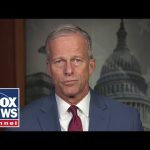The ongoing budget impasse in Washington is shaping up to be a high-stakes game of political chicken. With the government on the brink of a shutdown, the Speaker of the House, Mike Johnson, placed the blame squarely on Senate Majority Leader Chuck Schumer. He argued that Schumer is bowing to the more radical members of his party, allowing them to dictate the terms and thus jeopardizing the well-being of American citizens. In essence, it’s a tug-of-war between two very different ideologies, with the heart of the matter resting on financial responsibility and fiscal restraint.
According to Capitol Hill analysts, including the notably astute Brit Hume, the current situation brings back memories of similar confrontations in the past. For instance, during the Obama era, Republicans tried to block Obamacare through government shutdown threats, which ultimately led to backlash against them. This time around, many believe that the tables might turn, yet it all hinges on how the media portrays these events. Even if the Democrats did deserve blame for the shutdown, playing to the cameras could still shape public perception in ways that aren’t so flattering for the Republican Party.
The fundamental disagreement appears to be about how to manage the nation’s finances responsibly. Speaker Johnson mentions striving to push forward with a budget process that allows for meaningful discussion, but Democrats, particularly on the left flank led by fiery figures like Alexandria Ocasio-Cortez, seem less inclined towards compromise. This brings about a formidable obstacle to negotiations. The line is being drawn in the sand, with some members eager to gain every single ounce of what they want or continue the shutdown charade indefinitely.
Beneath the headline-grabbing rhetoric lies the reality that these budget battles affect real people. While some senators may feel the pressure of an impending shutdown, they may also be squirming under the weight of discontent from their constituents. If the situation drags on, those constituents may start howling in protest, stirring the pot of public opinion to the point where even some Democrats might reconsider their stances. The flawed strategy of relying solely on party loyalty can backfire spectacularly when faced with an angry electorate.
The intricacies of these negotiations point to a deeper and overarching reluctance on the part of many Democrats to ever work in concert with President Donald Trump or to acknowledge any successes from his administration. This sentiment of relentless resistance could lead to a predicament where, despite crippling consequences, negotiating terms with Republicans is seen as a non-starter. It’s a dramatic game of chess, and as players maneuver their pieces, the stakes for everyday Americans rise higher and higher.
In summary, the struggle in Washington is not just a simple budget issue; it embodies a broader ideological clash that sets the stage for the next few years. As both parties dig in their heels, the very fabric of governance hangs in the balance, and whether or not they can find common ground remains to be seen. Will the desire to maintain government operations outweigh the impulse to stick to their partisan guns? Time will tell, but the American people are watching closely, popcorn in hand, for the next episode of political drama unfolding in the nation’s capital.




